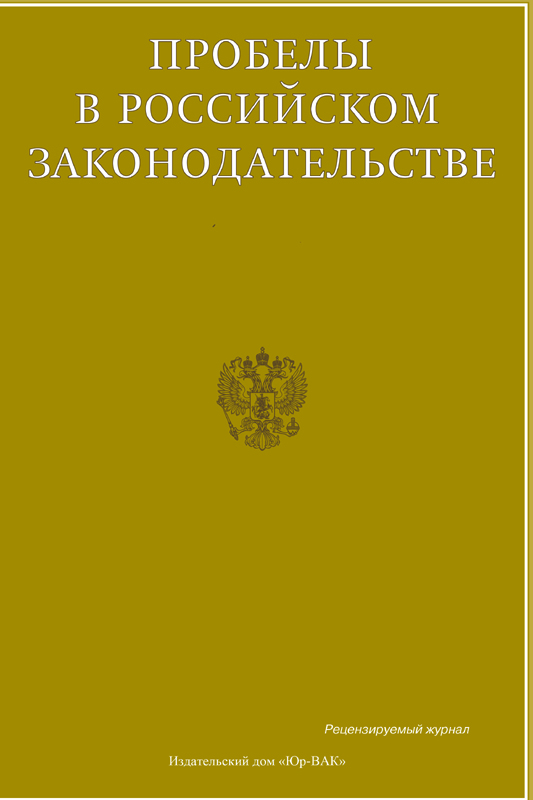Historical Aspect of the Institute of Subordination in Bankruptcy Law: «Soft» and «Hard» Model of Subordination
- Authors: Rusakova E.P.1, Zaytsev V.V.1
-
Affiliations:
- Рeoples Friendship University of Russia (RUDN University)
- Issue: Vol 15, No 4 (2022)
- Pages: 301-306
- Section: Articles
- URL: https://journals.eco-vector.com/2072-3164/article/view/531741
- ID: 531741
Cite item
Abstract
The relevance of the article is dictated by the fact that the institution of subordination in the bankruptcy law of Russia is at an early stage of development, the lack of legislative regulation, controversy, and unresolved issues. The author has set a goal to study the historical development of subordination in Russia, as well as to study the experience of development in foreign countries, in particular in Germany and Austria. The tasks include the analysis of the formation of subordination in Russia, the study of judicial practice that initiated the application of subordination of requirements in Russia. Also, the study of the subordination models of Germany and Austria as the most influential on the formation of subordination in Russia. The author concludes that the beginning of the development of subordination in Russia was laid down by the judicial practice of Russian courts, the intermediate link that consolidated subordination and approved a few rules for the application of subordination is the Review of Judicial Practice adopted by the Supreme Court of the Russian Federation dated 29.01.2020, which consolidated the Austrian model of subordination.
Full Text
About the authors
Ekaterina Petrovna Rusakova
Рeoples Friendship University of Russia (RUDN University)
Email: vickt.zayczev2012@yandex.ru
Dr.Sci.(Law), Associate professor, associate professor of the Department of Cicil law, civil procedure and International private law Moscow, Russian Federation
Viktor Vasilievich Zaytsev
Рeoples Friendship University of Russia (RUDN University)
Email: usakova-ep@rudn.ru
master student Moscow, Russian Federation
References
- Belousov I. A. Subordination of claims on loans of corporation participants in the bankruptcy case // Bulletin of Economic Justice of the Russian Federation. 2018. N 5. P. 120-169.
- Shaidullin A.I. Reduction in priority (subordination) of loans of participants of legal entities in Germany and Austria // Bulletin of Economic Justice of the Russian Federation. 2018. N 12. P. 116-158.
- Shirokova E. V. Efficiency of the civil law mechanism of subordination of creditors' claims in the case of bankruptcy of corporations // Legal science. № 4 (2021). P. 88 - 94
- Burukina O. A., Lyasnikov N. V., Dudin M. N., Frolova E. E. University goodwill and its valuation // EDULEARN Proceedings: 11th International Conference on Education and New Learning Technologies, Spain, 01-03 июля 2019 года. - Spain: IATED Academy, 2019. - P. 10040-10049. - EDN KPCATD.
- Frolova, E. E., Rusakova E. P. Trends in the Development of Alternative Ways of Dispute Resolution of Neo Industrialization Subjects // Modern Global Economic System: Evolutional Development vs. Revolutionary Leap: Institute of Scientific Communications Conference. - Cham: Springer Nature, 2021. - P. 1842-1849. - doi: 10.1007/978-3-030-69415-9_203. - EDN ECWPXH.
- Huber U. Gesellschafterdarlehen in GmbH- und Insolvenzrecht nach der MoMiG-Reform // ZIP. 2010
- Nowotny Ch. Probleme des eigenkapitalersetzenden Darlehens // ÖBA. 1994. P. 669.
- Ostheim R. Eigenkapitalersetzende Gesellschafterdarlehen in der Unternehmenskrise // Der Gesellschafter, Zeitschrift für Gesellschaftsund Unternehmensrecht. Österreich, 1989. P. 122-132.
- Ulmer P. Das neue GmbH-Recht in der Diskussion. Köln, 1981. P. 60.
- Weijs R.J., Breeman M. COMI-migration: Use or Abuse of European Insolvency Law // European Company and Financial Law Review. 2015. Vol. 11 (4). P. 500 - 502.
Supplementary files









